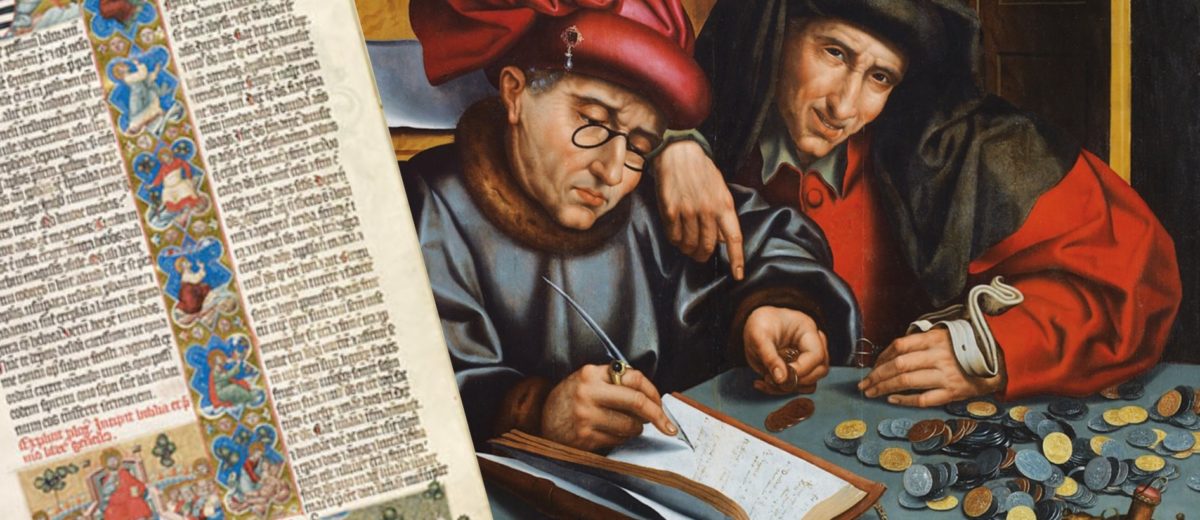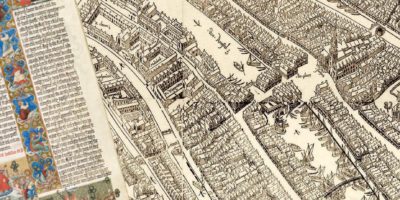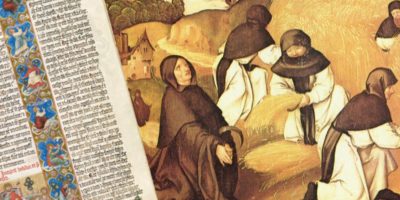The fifth in a series of draft chapters for a popular-style illustrated coffee-table book about how the Bible has shaped so many facets of our western lives. The first chapter proposed that the Bible is the key for understanding Europe. The second, third and fourth chapters explored the Bible’s influence on western art and music, architecture and design, and agriculture and gardening respectively. Feedback is welcomed.
The Bible may seem for many to be far removed from the world of business and economics. Yet our modern economy has been profoundly shaped by both the Old and New Testaments through the ages.
One contemporary economist calls our present day market capitalism ‘a secularised offspring of Hebrew and Christian tradition, beliefs and hopes’. Our belief in fairness, protecting the weaker from the stronger, our hope of a better future, our belief in human dignity and in freedom, as well as adherence to legal rules, stem from the Bible, not from secular scientific textbooks.
Economics is not value-free mathematical inquiry, as guru Milton Friedman would have us believe. Ultimately it is about choosing between good and evil. The Bible is full of economic thinking and norms, with over 700 references to money and economics. Think of Joseph and his introduction of the first seven-year economic plan in recorded history. Think of the Mosaic law, the proverbs and the prophets who addressed attitudes to wealth and possessions, stressed brotherly love, family duties, the common good and social responsibilities, especially to widows, the poor and sojourners. Recall the institution of the Jubilee year, in which after every forty-nine years debts were cancelled and lands were returned to the original owners, restricting the accumulation of wealth in the hands of the few and ensuring a level playing field for all.
Jesus told many stories about attitudes to money, wealth, poverty and spiritual values. Almost two thirds of the parables concern socio-economic contexts: the rich fool, the two debtors, the unjust steward and many more. He talked about rendering to Caesar what was Caesar’s and to God what was God’s. His command ‘to love God and love your neighbour as yourself’ has shaped western economic attitudes through the teachings of the Church, restricting unbridled greed and promoting a social conscience in the community.
Terms such as ‘credit’ and ‘debt’ were derived from spiritual concepts: ‘credit’ from ‘credo’, I believe; ‘debt’ also meaning ‘sin’ or ‘guilt’ in various European languages. (e.g. ‘forgive us our debts…’). Talking of credit and debt, the double-entry bookkeeping method now deployed globally was developed by a Franciscan friar, Luca Pacioli, to restore God’s order into the chaos of his own financial world.
Global charts and maps showing the quality of democracy ranking, the Gross National Product per capita, or the Transparency International Index showing the least corrupt nations, reveal a striking pattern. Topping each of these lists are the nations most shaped by the Bible through the Reformation (even if largely secular today), followed by Catholic countries, then Orthodox, and eventually Muslim, Hindu, Buddhist, communist and animist nations.
Although no fan of John Calvin, Max Weber traced the roots of capitalism to the Geneva Reformer’s strong work ethic, his emphasis on self-control and reverence for the biblical commands to not steal or covet, which gave foundations for private ownership and free enterprise. Calvin’s allowance of a modest four percent interest rate on loans lasted for four centuries in Switzerland, one of the long-term sources of Switzerland’s prosperity.
Adam Smith, often called the father of modern economics for his ground-breaking book The Wealth of Nations, was a professor of Christian moral philosophy at the University of Glasgow. He also wrote about the centrality of the concept of mutual sympathy, or empathy, the moral faculty that held self-interest in check.
Modern economics, broken loose from the ethical restraints Smith assumed, is causing dissatisfaction the world over. Yet the biblical texts, foundational to our western civilisation, remain a forgotten code offering timely and practical guidelines for a more just and equitable economic order.
The MASTERCLASS IN EUROPEAN STUDIES, 6-10 August, offers open evening sessions for all in the Upper Room, Prins Hendrikkade 50A, Amsterdam.
Sessions with Prof Evert Van de Poll, hosted by Jeff Fountain, will address the following topics including: MON: ‘The paradox of Europe’, TUES: ‘Europe: ‘post-christian’ or ‘post-secular’?’ ; WED: ‘Signs of hope for Europe today’; THU: ‘Barriers and bridges’; FRI: ‘Europe; what options?’. 19.30-21.30. Coffee & music from 19.00.
Till next week,




Jeff,
You had a chance to “hammer the final nail” in the pure economics coffin by stating that Smith’s second book, “Wealth of Nations” about ECONOMICS followed his first book, “Theory of Moral Sentiments,” the ETHICS of economics, i.e. like following the 10 Commandments in business. In my mind, if you mention Smith’s second book, you HAVE to mention his first book, too. But good content none the less.
Kevin
Definitely a worthy topic. I agree with your basic thesis that God has much to say about commerce and economics. I disagree with a couple comments. Your arguments do not need to discredited Milton Friedman as a “value-free” economist. Nothing could be further from his writings or teachings. His recurring primary value was freedom. And that shaped be his economics. I’d characterize Milton Friedman as a great value-based economist.
“The most important single central fact about a free market is that no exchange takes place unless both parties benefit.”
“I am an agnostic. I do not ‘believe in’ God, but I am not an atheist, because I believe the statement, ‘There is a god’ does not admit of being either confirmed or rejected. I do not believe God has anything to do with economics. But values do.”
“(1) Agnosticism ‘I do not know.’ (2) Atheism ‘I know that there is no god.’ (3) I do not know where my values come from, but that does not mean (a) I don’t have them, (b) I don’t hold them as strongly as you hold your belief in God. (c) They turn out — not accidentally, I believe — to be very much like these held by most other people whether Christian, Jewish, Muslim, atheist, agnostic, or abstract. (d) Which leads me to believe that they are a product of the same evolutionary process that accounts for the rest of our customs as well as physical characterizations.”
For more on Friedman’s religious and values views:
https://thedailyhatch.org/2012/07/24/milton-friedmans-religious-views/amp/